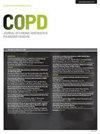GSTP1 rs4147581 C>G and NLRP3 rs3806265 T>C as Risk Factors for Chronic Obstructive Pulmonary Disease: A Case-Control Study
IF 3.1
3区 医学
Q1 Medicine
International Journal of Chronic Obstructive Pulmonary Disease
Pub Date : 2024-02-22
DOI:10.2147/copd.s445680
引用次数: 0
Abstract
Background: Chronic obstructive pulmonary disease (COPD) is a chronic respiratory ailment influenced by a blend of genetic and environmental factors. Inflammatory response and an imbalance in oxidative-antioxidant mechanisms constitute the primary pathogenesis of COPD. Glutathione S-transferase P1(GSTP1) plays a pivotal role as an antioxidant enzyme in regulating oxidative-antioxidant responses in the pulmonary system. The activation of the NOD-like receptor thermal protein domain (NLRP3) inflammatory vesicle can trigger an inflammatory response. Several investigations have implicated GSTP1 and NLRP3 in the progression of COPD; nonetheless, there remains debate regarding this mechanism.Methods: Employing a case-control study design, 312 individuals diagnosed with COPD and 314 healthy controls were recruited from Gansu Province to evaluate the correlation between GSTP1 (rs4147581C>G and rs1695A>G) and NLRP3 (rs3806265T>C and rs10754558G>C) polymorphisms and the susceptibility to COPD.
Results: The presence of the GSTP1 rs4147581G allele substantially elevated the susceptibility to COPD (CGvs.CC:OR=3.11,95% CI=1.961– 4.935, P< 0.001;GGvs.CC:OR=2.065,95% CI=1.273– 3.350, P=0.003; CG+GGvs.CC:OR=2.594,95% CI=1.718– 3.916, P< 0.001). Similarly, the NLRP3rs3806265T allele significantly increased the susceptibility to COPD (TC:TT:OR=0.432,95% CI=0.296– 0.630; TC+CCvs.TT:OR=2.132,95% CI=1.479– 3.074, P< 0.001). However, no statistically significant association was discerned between the rs1695A>G and rs10754558G>C polymorphisms and COPD susceptibility (P> 0.05).
Conclusion: In summary, this study ascertained that the GSTP1 rs4147581C>G polymorphism is associated with increased COPD susceptibility, with the G allele elevating the risk of COPD. Similarly, the NLRP3 rs3806265T>C polymorphism is linked to elevated COPD susceptibility, with the T allele heightening the risk of COPD.
GSTP1 rs4147581 C>G 和 NLRP3 rs3806265 T>C 作为慢性阻塞性肺病的风险因素:病例对照研究
背景:慢性阻塞性肺疾病(COPD)是一种慢性呼吸系统疾病,受遗传和环境因素的共同影响。炎症反应和氧化-抗氧化机制失衡是慢性阻塞性肺病的主要发病机制。谷胱甘肽 S 转移酶 P1(GSTP1)作为一种抗氧化酶,在调节肺系统的氧化-抗氧化反应中发挥着关键作用。NOD 样受体热蛋白结构域(NLRP3)炎症囊泡的激活可引发炎症反应。多项研究表明,GSTP1 和 NLRP3 与慢性阻塞性肺病的进展有关;然而,关于这一机制仍存在争议:方法:采用病例对照研究设计,从甘肃省招募了 312 名慢性阻塞性肺病患者和 314 名健康对照者,评估 GSTP1(rs4147581C>G 和 rs1695A>G)和 NLRP3(rs3806265T>C 和 rs10754558G>C)多态性与慢性阻塞性肺病易感性之间的相关性:结果:GSTP1 rs4147581G等位基因的存在大大增加了慢性阻塞性肺病的易感性(CGvs.CC:OR=3.11,95% CI=1.961-4.935,P<0.001;GGvs.CC:OR=2.065,95% CI=1.273-3.350,P=0.003;CG+GGvs.CC:OR=2.594,95% CI=1.718-3.916,P<0.001)。同样,NLRP3rs3806265T 等位基因显著增加了慢性阻塞性肺病的易感性(TC:TT:OR=0.432,95% CI=0.296-0.630;TC+CCvs.TT:OR=2.132,95% CI=1.479-3.074,P< 0.001)。然而,rs1695A>G和rs10754558G>C多态性与慢性阻塞性肺病易感性之间没有统计学意义(P> 0.05):综上所述,本研究发现 GSTP1 rs4147581C>G 多态性与慢性阻塞性肺病易感性增加有关,G 等位基因会增加慢性阻塞性肺病的患病风险。同样,NLRP3 rs3806265T>C多态性与慢性阻塞性肺病易感性增加有关,T等位基因会增加慢性阻塞性肺病的风险。
本文章由计算机程序翻译,如有差异,请以英文原文为准。
求助全文
约1分钟内获得全文
求助全文
来源期刊

International Journal of Chronic Obstructive Pulmonary Disease
RESPIRATORY SYSTEM-
CiteScore
5.10
自引率
10.70%
发文量
372
审稿时长
16 weeks
期刊介绍:
An international, peer-reviewed journal of therapeutics and pharmacology focusing on concise rapid reporting of clinical studies and reviews in COPD. Special focus will be given to the pathophysiological processes underlying the disease, intervention programs, patient focused education, and self management protocols. This journal is directed at specialists and healthcare professionals
 求助内容:
求助内容: 应助结果提醒方式:
应助结果提醒方式:


